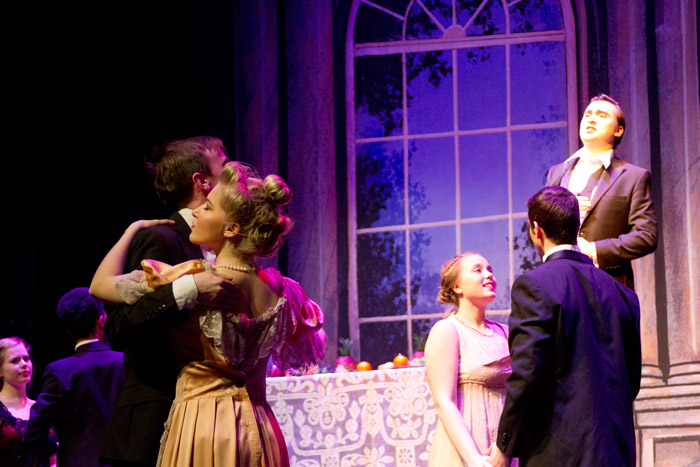Opera is an art form that has been in jeopardy for at least the last few decades. With a near complete lack of any notable new operas since the early 20th century, the entire genre is in danger of becoming stagnant without the intervention of passionate fans who are willing to update them for a modern audience. McGill’s Savoy Society delivers another valiant effort to keep opera alive in its production of The Merry Widow, its first non-Gilbert and Sullivan production since at least the 1980s.
Composed by Franz Lehar, written by Viktor Leon and Leo Stein, and directed by Russell Wustenberg, the opera follows Anna (Ana Toumine), the widow of a recently-deceased banker focusing on the question of who she will marry, and thus share her wealth with. The Baron (Jonah Spungin) of an economically floundering Baltic state tries to convince her to marry a countryman to keep his nation from crumbling. Though she has a trail of suitors from all over the globe following her, she is drawn to Count Danilo (Bruno Roy), a caddish ex-lover who now spends his time boozing and womanizing. The show wrings every bit of farce that it can from the scenario, piling up intersecting subplots about love and infidelity among the cadre of elites who find themselves in the widow’s orbit.
Despite some of the expected creakiness of an opera written in 1905, the production has a comic sensibility that is surprisingly modern. A lot of this comes from the fact that most of the opera’s comedy comes from highly versatile territory: Comeuppance for the arrogant, physical comedy, and dramatic irony. In other places, the line readings are delivered with more of an edge than was probably present in its original incarnation. But most importantly, the play attempts to directly address the highly outdated gender politics of the opera. This was an explicit concern of the production team, who recognized that the mores of the past are greatly out of sync with the present.
“The biggest concern that I had […] was what was the context of the time?” said Stage Director Russell Wustenberg. “My biggest change is I actually took the most famous piece of music [from the opera…] and instead of having it entirely sung by men, I allowed the women to sing their response to the men.”
Of course, a production can only take so many liberties without losing thread of the text, so Anna never really considers the idea that she doesn’t have to marry anyone. Instead, the opera ends as one would expect, with a highly sentimental third act set in the fairy-lit glow of Anna’s ballroom, underlining the importance of love. While it’s somewhat disappointing that a production this comparably modern would end on such a predictable note, the sentiment feels earned, mainly due to the performances.
Toumine and Roy anchor the production, each bringing their own brand of charisma and playing off of each other in numbers like “All’s one to all men where there’s gold” with a fantastic ease and sense of timing. Valencienne (MacKenzie Stone) and Camille (Zachary Rubens) serve as younger, more naive counterpoints to the central couple, bringing a welcome ray of earnestness amid the cynicism of the older married couples. The rest of the cast serves a mainly comedic role with Spungin’s oblivious Baron and Talia Fuchs’ put-upon emissary Njegus as the clear standouts. The sheer number of subplots means that no character wears out their welcome, but each gets a moment to shine.
The music is top-to-bottom fantastic, accompanied by an especially well-oiled orchestra. Russell’s aforementioned tweaking of “You’re back to where you first began” lends a satirical edge to what could otherwise come off as woefully outdated. Accordingly, the choreography is loose and modern, full of anachronistic flourishes that imbue the opera with a modern energy. The sets and lighting are beautifully impressionistic, giving each act a distinct feel and colour palate that correspond with the emotion of the main characters.
Guided by Producers Narmada Gunawardana and Maia de Graaf, The Merry Widow manages to mostly transcend the trappings of its source material, making the opera feel modern again.
The Merry Widow is playing on Feb. 19 – 20 in Moyse Hall. Tickets are $10 for students.










Pingback: The Merry Widow: Photos and Press Review | The McGill Savoy Society
Pingback: The Merry Widow: Press Review and Photos | The McGill Savoy Society